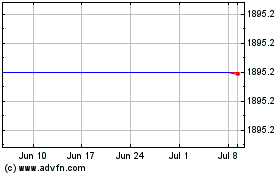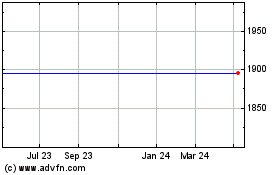By Sarah McFarlane and Ben Dummett
Europe's push toward cleaner energy and declining oil demand are
threatening its refineries, some of which have been struggling to
find buyers for years.
The continent has led the global drive away from fossil fuels by
integrating renewable energy, including solar and wind power, into
its power grid and supporting the development of electric vehicles.
The region has implemented more climate policies than any other
part of the world, according to the European Union.
That effort has clouded the outlook for many refineries, some of
which are small and old. A number of them have gone up for sale in
the past three years, and few have resulted in deals because of a
lack of buyers or disagreements on price.
Royal Dutch Shell PLC said in June that it plans to sell around
half of its refineries globally. Since 2016, it has unsuccessfully
tried to sell refineries in Denmark and Germany. Shell is
continuing to look at its portfolio of refineries and has "no plans
on closing anything at this moment in time," Chief Financial
Officer Jessica Uhl said in October.
Exxon Mobil Corp. has been unable to sell the Slagen refinery it
offered for sale earlier this year. The facility is located in
Norway, the country with the highest proportion of electric
vehicles in the world.
Total SA also was unsuccessful in selling its U.K. Lindsey
refinery, while Greece's largest oil refiner, Hellenic Petroleum
SA, didn't receive any final bids for a majority stake in its
refineries.
Shell, Exxon, Total and Hellenic Petroleum declined to
comment.
"I'm not a believer of the fact you can sell European
refineries; it's going to be more closures," said Raul Alcamo,
London-based head of refining at consulting firm Energy
Aspects.
Initial public offerings also have been hit. The planned IPO of
Varo Energy BV, the European oil refiner jointly controlled by
Vitol Group and Carlyle Group LP, was canceled last year because of
unfavorable market conditions.
Globally, refining is struggling where governments are more
aggressive with new climate policies but growing in areas with less
regulation and rising fuel demand. Some state-owned oil companies
in Asia and the Middle East, including Saudi Arabian Oil Co., also
known as Aramco, continue to invest in new refineries in places
such as India.
Since 2012 around 1.8 million barrels a day of refining capacity
has been shuttered in Europe, shrinking the region's capacity to
15.3 million barrels a day. Globally the trend is the opposite with
Asia, the Middle East and Africa adding capacity, according to
Energy Aspects. Asia is expected to be the driver of global
oil-demand growth.
Oil demand in Europe peaked in 2006, according to BP PLC's
annual statistical review.
Of the refineries that remain in Europe, many are struggling.
"We calculate that 17% of refining capacity in Europe, particularly
in France and Italy, is at risk of negative margins," Mr. Alcamo
said.
Refining margins in Europe in December are around a three-year
low, with 82% of refining capacity expected to be utilized in 2019,
according to consulting firm Wood Mackenzie.
Margins and utilization rates are expected to get a temporary
boost in 2020 with the global adoption of rules on cleaner shipping
fuel on Jan. 1, but analysts expect the trend to revert lower in
Europe over the coming decade.
"Utilization rates below 80% are not sustainable, indicating
that the region is oversupplied and that refineries in this region
will be pressured to shut down," said Heitham Tolba, research
analyst at Wood Mackenzie, adding that European refineries are, on
average, more than 50 years old.
Closing down an aging refinery isn't always the obvious answer
for oil companies eager to cut their losses. Environmental
liabilities can make the facilities expensive to shutter. Ground
contamination sometimes makes it more attractive to convert sites
for alternative uses such as fuel storage.
But this may work only as a medium-term fix, given many
countries in the region -- including France, the U.K. and Ireland
-- already plan to phase out fossil fuel cars by 2040, something
the European Commission also is considering.
In some instances, energy companies are refurbishing refineries.
Exxon is investing $1 billion to expand its Fawley refinery on the
U.K.'s south coast to boost its production of less polluting
ultralow sulfur diesel, while Repsol SA's $3 billion investment to
modernize its Cartagena refinery in southeastern Spain was the
largest industrial investment in the country's history.
Some refineries in Germany are looking to branch out into
so-called green hydrogen, produced by electrolysis, using
electricity from renewables to split water into hydrogen and
oxygen. The hydrogen isn't yet economical, and the refineries are
seeking government funding.
Raffinerie Heide GmbH in northern Germany plans to gradually
transition out of producing traditional fuels and into making
synthetic fuel from hydrogen and carbon dioxide, which could supply
customers such as the aviation industry.
"If you don't invest now -- the time, effort, money -- into
exploring new decarbonizing ways, and being part of the change, and
take this as an opportunity rather than as a threat, it might be
too late," said the refinery's chief executive, Jürgen
Wollschläger.
Write to Sarah McFarlane at sarah.mcfarlane@wsj.com and Ben
Dummett at ben.dummett@wsj.com
(END) Dow Jones Newswires
December 23, 2019 09:14 ET (14:14 GMT)
Copyright (c) 2019 Dow Jones & Company, Inc.
Shell (LSE:RDSA)
Historical Stock Chart
From Aug 2024 to Sep 2024

Shell (LSE:RDSA)
Historical Stock Chart
From Sep 2023 to Sep 2024
